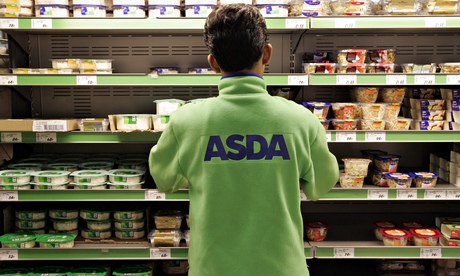
It's the start of the great summer getaway and the traffic is heavy as families pile into their cars and head for British beaches that for once are as hot as their Mediterranean rivals.
There's a lot to organise, but for families zooming along the A64 for Scarborough's sun-kissed sands, stocking up on holiday groceries has never been easier. A quick pitstop at Asda's drive-thru on the outskirts of York and you can have the shopping in the boot and be back on the road within five minutes. "You can order from your caravan or on the journey," says Mark Ibbotson, Asda's chief operations officer. The service will reach 200 stores by the end of this year.
Heatwave or no heatwave, it has never been so easy to avoid setting foot in a supermarket, either by shopping online or making more frequent trips to local convenience stores. This is causing a major headache for grocery giants, who have spent the last 20 years engaged in a "space race" to open the most supermarkets.
Tesco won that battle and is almost twice as big as market number two Asda. But changing shopping patterns mean that those miles of shopping aisles are now weighing on profitability. Big-box out-of-town stores face a very uncertain future. The Institute of Grocery Distribution, the industry thinktank, predicts that £3bn less will be rung up in big stores (over 25,000 sq ft) in five years' time. Meanwhile, the market share commanded by the high street discounters – Aldi, Lidl and Poundland – will almost double in size to account for £1 out of every £9 spent on British groceries.
"The reality is that the model of retailing for the last 60 years is no longer fit for the changing needs of consumers," says one senior industry source. "The question is: what are you doing to adapt your space to the new economics?"
There is a lot of experimentation going on, much of it led by Tesco. Philip Clarke, who was ousted as chief executive last week, was trying to reinvent its nearly 250 Extra shops, which can be as big as 120,000 sq ft, as shopping destinations. Tesco has been turning over space to food outlets such as Harris + Hoole, which it half owns, and Euphorium Bakeries, as well as to gyms and soft play centres. It has even let surplus car park space to vehicle hire firm Avis.
Asda, part of US giant Walmart, has also been unpicking its business model. Its 355 supermarkets range in size from 15,000 sq ft to in excess of 100,000 sq ft.
Earlier this month, Asda announced 1,360 job losses as part of a five-year programme to cut costs by £1bn. Ibbotson said changing shopping habits meant it had to "reassess" its strategy. "I have been in the industry for 30 years and in the past three years it has changed more [than the previous 27 years] and we expect for it to change more quickly over the next three years than the last [three]," said Ibbotson.
In the York store, which is a testbed for a lot of Asda's new ideas, checkout staff are disappearing, replaced by self service tills. It is also testing a "rapid scan" till that can scan groceries three times as fast as any human.
Drive-thrus are not stealing sales from the adjoining stores, Asda insists, but at York only a third of drive-thru shoppers park and pop into the store. "We're not seeing any cannibalisation," Ibbotson says. "It's complementary because of the growth of the grocery home shopping business."
Asda is cashing in on Britain's growing love affair with click-and-collect shopping by putting collection points in its stores as well as in petrol stations and installing unmanned secure lockers near office blocks where commuters can collect their groceries on the way home.
Kantar Retail analyst Bryan Roberts says Tesco and Asda are battling "non-food hangovers" in their big stores as former money-spinners – such as electricals, toys, books, DVDs and CDs – have been hit hard by the internet. "Asda is more exposed than most to this trend because the vast majority of its sales come through superstores, but what has insulated it is [fashion label] George, which is a destination brand," he says. "Tesco has got a problem with its big box stores because it doesn't have a George."
Roberts reckons many of Tesco's problems are of its own making, because it falls short on retail basics. "All the coffee shops in the world aren't going to fix a lack of manpower and getting the basics right," he adds.
But one supermarket chief reckons that big-box grocery could yet return to vogue once Britons' spending power recovers: "As the economy swings back there could be a shift back in favour of them, because the economic model is best served by them. In big stores, prices are lower and choice is better. This is something the industry has to figure out, but it can't carry on subsidising unprofitable channels [like online] forever. In that sense what Philip Clarke was doing was not a stupid strategy by any means."

